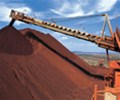

Last week, special forces soldiers called military junta, ousted Guinea’s (West Africa’s mineral-rich country) long-serving president Alpha Conde, immediately casting a shadow of uncertainty over key iron ore and bauxite supplies.
The coup was carried out by an elite special forces unit, led by 41-year-old Col. Mamady Doumbouya. The soldiers dissolved the country’s government and closed land and air borders with immediate effect.
“We have dissolved government and institutions,” Doumbouya said on state television, draped in Guinea’s national flag. “We are going to rewrite a constitution together,” he said.
Doumbouya’s actions driven by the state of his country — poverty, endemic corruption, economic mismanagement — did not sit well with the United Nations (UN). All these factors have contributed to the country being one of the poorest nations, despite being rich in essential minerals.
Among other things, this coup may rattle mineral mining operations that are essential for global supply chains to work.
Iron Ore
Simandou range in Guinea is a host to one of the largest and mint iron ore deposits in the world. It contains over 8.5 billion tons of iron ore and might contain an average of 65 percent iron content.
These reserves were discovered in the 1990s but it has been dealing with wrangling and corruption all these years, leaving the minerals untapped.
This hilly area is situated in the remote southeastern interior of the country. Conakry — Guinea’s capital — and its western coastline that connects Guinea to the world are miles away from these ranges.
There was always a geopolitical risk associated with the progress of Simandou, but the coup will further make the development of these ranges difficult. In fact, Andrew Gadd, a senior steel analyst told CNBC this coup “marks a significant deterioration in the prospects for successful development of the deposit.”
Guinea ranks 160th in the top ‘per capita GDP countries’ list, out of 186 countries, according to IMF. It requires investment on a massive scale for developing these reserves. But investors have been reticent in investing given the risk that material prices could plunge.
For some time there in 2020, the outlook for the industry appeared slightly brighter — a China-backed consortium had signed a deal to develop the site.
But after the coup, the project can face further setbacks.
Bauxite
Bauxite is the world’s second-largest producer of bauxite. And bauxite is a major source of aluminium, a raw material used in manufacturing automobiles. So the news of the coup rattled aluminium markets so much that the prices jumped to a 13-year high.
A tone of aluminium on the London Metal Exchange (LME) is trading at $2,817 — the highest level since August 2008.
The coup is bad news for the country’s mining sector. But globally, bauxite supply chains have already taken a hit as the operations might stay shut for some days.
“For the country’s booming mining sector, the situation could not come at the worst time. Miners now have little other option than to sit tight and await further clarity from the transitional authorities. But contract renegotiation or even expropriation cannot be discounted.” Eric Humphery-Smith, an Africa analyst told CNBC.
While the new transitional government, led by the military junta, have opened borders and ports, and have encouraged miners to resume operations, there has been no clear communication from the authorities.
The country supplies 20 percent of the world’s bauxite to China and Russia. The revenue accounts for 35 percent of Guinea’s GDP — estimated at $26.5 billion in 2020.
While Doumbouya has supported the development of key mineral-related projects in the country, there are stipulations the new government might not be favourable with codes and laws.
Meanwhile, Kremlin said Tuesday it hiped Russian business interests in the African country would not suffer.
Russian aluminium giant Rusal has already said it aims to keep its three bauxite mines and one alumina refinery in the country, regardless of the coup. However, it added it could recall its employees from the country if the crisis worsened.
Rusal is the world’s third-largest aluminium producer and Guinea’s mines account for 42 percent of Rusal’s total bauxite capacity.
Beijing, on the other hand, imports 47 percent of Guinea’s bauxite. Chinese companies are also heavily invested in mining minerals. Supply disrupts from Guinea might draw China to Australia, which analysts say, Beijing wants to avoid.
Source: CNBCTV18